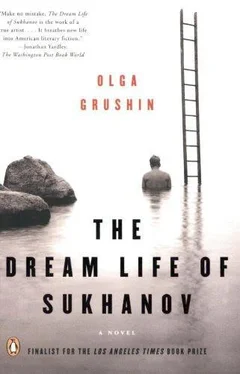The train had left the station.
In spite of the unreal hour, the car he found himself in was full to the point of bursting. As soon as he recovered his balance, he elbowed his way through, standing on tiptoe now and then in hopes of glimpsing the old-fashioned hat and the yellow beard. But the stranger was nowhere to be seen, and in a short while, Sukhanov started having nagging little doubts about a station office supposedly open so late at night, his stumbling through a chicken coop, the fact that no one seemed to demand a ticket from him after all…. And when the truth finally dawned on him, it was simple, as most truths are. He had been duped out of his bag.
He felt too worn out for anger, even when he remembered his expensive coat. Turning back in resignation, he lurched through the crammed aisle, navigating between feet and parcels, looking, with diminishing hope, for a place to sit. And it was then that he noticed, for the first time clearly, the other passengers, and his steps faltered uneasily. Pressing upon him in the unsteady light of a few bare bulbs were people in drab clothes, with stony, dark, prematurely aged faces, heads swaying loosely in time to the thudding wheels, vacant eyes staring into nothing, features distorted by grotesque deformities of sunken mouths, broken noses, monstrous warts, missing teeth…
These were not the people he met in the busy streets of old Moscow—they belonged rather among the medieval fiends of Bosch’s tortured landscapes of hell. He glanced about, covertly at first, then almost wildly, seeking out a splash of color, a pleasant countenance, a lively expression, a natural smile; but the grim, wordless, disfigured masses enclosed him on all sides like a silent gray sea. His unease began to slide into fear. He wondered to what final destination all these perversions of human beings could possibly be heading at this hour of the night, and peering closer, thought he saw disturbing, freakish objects protruding over the rims of their draped baskets or nestled in their yawning bags—a hoof of a severed bovine leg, a drooping neck of a bird, a rusty cemetery cross with clumps of reddened earth still sticking to it. And suddenly it seemed to him that he had accidentally stumbled on some secret nocturnal world, the unseen bowels of Russia, where no outsider was ever allowed—that he was painfully, obviously out of place here—that everyone was already starting to notice his presence, to stir, to mutter, to turn around, to devour him with those heavy, empty, terrifying, alien eyes—
In the next instant he caught sight of a miraculously preserved wedge of space between a shrunken old man sleeping with his mouth agape and a fat woman fussing with a crumpled newspaper. Mumbling inaudible apologies, he squeezed through the still wall of monsters, lowered himself onto the edge of the bench, and hastened to close his eyes. Soon he was wading in and out of anxious dreams in which he again strode up and down the Bogoliubovka platform—and so real were the visions of the blinking lamp and the gleaming tracks that only the sporadic wakeful glimpses of the pink, childlike gums of the man on his left and the nauseating smell of vobla, the salty dried fish the woman on his right had eventually unwrapped from a Pravda editorial and was now eating with repulsive sucking noises, reassured Sukhanov that he was indeed on a train, moving closer and closer to Moscow with every passing moment.
Yet after some time—twenty minutes maybe, or forty, or even an hour—he wondered through the haze of his slumber why they still rumbled on, with no announcements and no stops. Forcing himself awake, he attempted to look out the window, but the old man was leaning against it, blocking his view; all he could see were wide patches of blackness superimposed with bright reflections of the man’s gnarled hands. Feeling apprehensive, Sukhanov turned to his other neighbor and was met by the oily gaze of the half-eaten fish. The woman was busy picking at her teeth. She looked astonishingly like the wife of a certain theater critic he knew, he realized now. The thought dismayed him for some reason.
“Pardon me,” he said, “but do you know how soon we’ll be arriving in Moscow?”
On the other side, the old man stirred.
“Moscow? We aren’t going to Moscow, my friend,” he said, not opening his eyes. He spoke with a funny lisp. “We are heading east—Murom, Saransk, Inza…”
Sukhanov swung around and stared at the man in horror.
“Don’t listen to him, he’s not all there,” the woman’s voice blustered at Sukhanov’s back. “Old age will do it to you. I reckon we should be getting to Moscow in less than an hour.”
“Oh,” said Sukhanov faintly. “Oh.”
The old man dropped off to sleep without another remark, but a calm, knowing smile played on his lips. With blank eyes, Sukhanov watched the woman unhurriedly brush the fish remains onto the floor, fake amethysts the size of walnuts sparkling in her meaty earlobes. And all at once his presence here, among these strange people, in this train hurtling who knew where, seemed so unbearable that he could no longer remain sitting still, following the passage of time in his befuddled mind, guessing at the contours of the night they traveled through, his thigh squashed against the woman’s repugnantly voluminous side…. Nodding mechanically at the old man, he stood up and shakingly made his way back into the aisle.
Here the press of bodies had become even denser. He pushed through, intending to position himself by the nearest window, when the sight of all these heads bobbing before the expanse of the lit wall punctuated by rectangles of framed darkness struck him as an unexpectedly familiar paraphrase of some other, distant scene. He paused for a moment, attempting to place his sudden déjà vu; then, giving up, resumed his efforts to get through.
People were standing three and four deep, talking to one another in undertones, all eager to get a better look. He too felt the excitement rising from his feet, numb after so many hours of waiting in line to enter, into the tips of his fingers. Finally, there it was, unobstructed, before him: the fluid wisp of a girl acrobat balancing on a ball, with a misty desert behind her, and in the foreground, the muscular back of a man in repose, the whole scene glowing softly with pinks, blues, and grays—a poignantly lyrical metaphor of humanity as a carnival troupe of performers and freaks, a striking juxtaposition of strength and fragility, roughness and smoothness, immobility and motion. A masterpiece of Picasso’s early period.
With many others, Anatoly stood and looked at the painting that had been rescued so magically from some terrible cave of a locked storage room, where it had languished for dark, musty decades. And after a while, it began to seem like a mysterious window into a new, tantalizingly foreign world where possibilities were endless, where truths were manifold, where an altogether different artistic language was spoken—a language I did not as yet know, did not as yet understand, but had been avidly trying to learn all through that year, the year of 1956. All the same, the grainy magazine reproductions and the black-and-white catalogues of across-the-ocean shows circulating at Yastrebov’s gatherings had not prepared me for the shock of coming face to face with an actual paint-and-brush work of Picasso, the giant of Western art, exhibited for the first time, unbelievably, here, in Moscow, in the very Pushkin Museum of Fine Arts where as a little boy I had seen Tatlin’s flying machine and where for many subsequent years one could find nothing but a dusty spread of lamps, flags, and carpets presented to Stalin on his birthdays. And even though most of Picasso’s other paintings on display left me vaguely puzzled and disappointed, that first sight of Young Girl on a Ball sustained its precious ringing note throughout my being, and that evening, as I ran home along the quickly darkening autumnal streets, my mind strove to absorb the revolutionary freedom of modernism and my hands ached to try these new, as yet unexperienced, colors and forms….
Читать дальше








![Theresa Cheung - The Dream Dictionary from A to Z [Revised edition] - The Ultimate A–Z to Interpret the Secrets of Your Dreams](/books/692092/theresa-cheung-the-dream-dictionary-from-a-to-z-r-thumb.webp)



